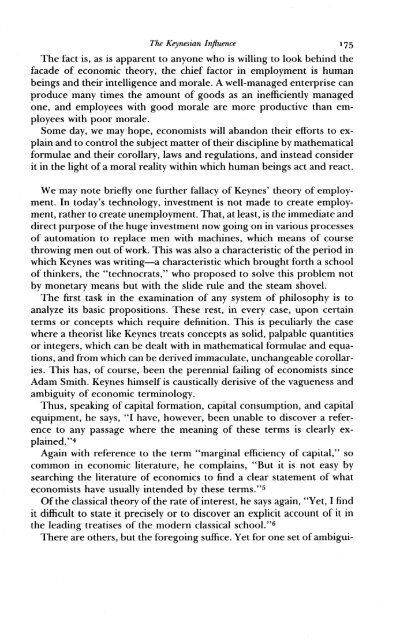You also want an ePaper? Increase the reach of your titles
YUMPU automatically turns print PDFs into web optimized ePapers that Google loves.
The Keynesian Influence 175<br />
The fact is, as is apparent to anyone who is willing to look behind the<br />
facade of economic theory, the chief factor in employment is human<br />
beings and their intelligence and morale. A well-managed enterprise can<br />
produce many times the amount of goods as an inefficiently managed<br />
one, and employees with good morale are more productive than employees<br />
with poor morale.<br />
Some day, we may hope, economists will abandon their efforts to explain<br />
and to control the subject matter oftheir discipline by mathematical<br />
formulae and their corollary, laws and regulations, and instead consider<br />
it in the light ofa moral reality within which human beings act and react.<br />
We may note briefly one further fallacy of Keynes' theory of employment.<br />
In today's technology, investment is not made to create employment,<br />
rather to create unemployment. That, at least, is the immediate and<br />
direct purpose ofthe huge investment now going on in various processes<br />
of automation to replace men with machines, which means of course<br />
throwing men out ofwork. This was also a characteristic of the period in<br />
which Keynes was writing-a characteristic which brought forth a school<br />
of thinkers, the "technocrats," who proposed to solve this problem not<br />
by monetary means but with the slide rule and the steam shovel.<br />
The first task in the examination of any system of philosophy is to<br />
analyze its basic propositions. These rest, in every case, upon certain<br />
terms or concepts which require definition. This is peculiarly the case<br />
where a theorist like Keynes treats concepts as solid, palpable quantities<br />
or integers, which can be dealt with in mathematical formulae and equations,<br />
and from which can be derived immaculate, unchangeable corollaries.<br />
This has, of course, been the perennial failing of economists since<br />
Adam Smith. Keynes himself is caustically derisive of the vagueness and<br />
ambiguity of economic terminology.<br />
Thus, speaking of capital formation, capital consumption, and capital<br />
equipment, he says, "I have, however, been unable to discover a reference<br />
to any passage where the meaning of these terms is clearly ex<br />
plained."4<br />
Again with reference to the term "marginal efficiency of capital," so<br />
common in economic literature, he complains, "But it is not easy by<br />
searching the literature of economics to find a clear statement of what<br />
economists have usually intended by these terms."5<br />
Ofthe classical theory ofthe rate ofinterest, he says again, "Yet, I find<br />
it difficult to state it precisely or to discover an explicit account of it in<br />
the leading treatises of the modern classical school."6<br />
There are others, but the foregoing suffice. Yet for one set ofambigui-

















